

What Is Objectivism? Download the pdf or mp3 of this article.

It is widely believed today that our moral, cultural, and political alternatives are limited either to the ideas of the secular, relativistic left—or to those of the religious, absolutist right—or to some compromised mixture of the two. In other words, one’s ideas are supposedly either extremely “liberal” or extremely “conservative” or somewhere in between. Ayn Rand’s philosophy, Objectivism, rejects this false alternative and offers an entirely different view of the world.
Objectivism is fully secular and absolutist; it is neither liberal nor conservative nor anywhere in between. It recognizes and upholds the secular (this-worldly) source and nature of moral principles and the secular moral foundations of a fully free, fully civilized society. Morally, Objectivism advocates the virtues of rational self-interest—virtues such as independent thinking, productiveness, justice, honesty, and self-responsibility.
The Nature of Reality. The Facebook Algorithm Change 2018: What it Means for Brands. Since Mark Zuckerberg’s 2018 announcement that the Facebook algorithm will prioritize “meaningful interactions” from friends and family over content from brands, it has become trickier than ever to ensure your organic content gets the screen time it deserves.

But, Facebook is still the largest social media network in the world. Making its algorithm work for you is key to a successful Facebook marketing strategy. Read on to find out: Which metrics Facebook prioritizes in its News Feed algorithmHow the 2018 algorithm update affects brands on FacebookWhat “Meaningful Interactions” meanTips to increase organic reach on Facebook Bonus: Download a free guide that teaches you how to turn Facebook traffic into sales in four simple steps using Hootsuite. How the Facebook algorithm works in 2018 On January 11th, 2018, Mark Zuckerberg announced that Facebook would be changing its News Feed algorithm to prioritize content from “friends, family and groups.” How Facebook Makes Us Dumber.
Why does misinformation spread so quickly on the social media?
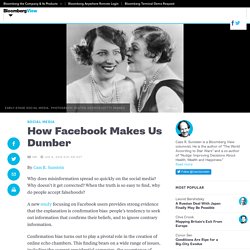
Why doesn’t it get corrected? When the truth is so easy to find, why do people accept falsehoods? A new study focusing on Facebook users provides strong evidence that the explanation is confirmation bias: people’s tendency to seek out information that confirms their beliefs, and to ignore contrary information. Confirmation bias turns out to play a pivotal role in the creation of online echo chambers. This finding bears on a wide range of issues, including the current presidential campaign, the acceptance of conspiracy theories and competing positions in international disputes. The new study, led by Michela Del Vicario of Italy’s Laboratory of Computational Social Science, explores the behavior of Facebook users from 2010 to 2014.
"On My Block" and "In the Long Run" give working-class people the loving portraits they deserve. In 1936, George Orwell gave up his part-time job as a bookshop assistant in London and headed north on a fact-finding mission.

His subject? The trouble with charitable billionaires. In February 2017, Facebook’s founder and CEO Mark Zuckerberg was in the headlines for his charitable activities.

The Chan Zuckerberg Initiative, founded by the tech billionaire and his wife, Priscilla Chan, handed out over $3m in grants to aid the housing crisis in the Silicon Valley area. David Plouffe, the Initiative’s president of policy and advocacy, stated that the grants were intended to “support those working to help families in immediate crisis while supporting research into new ideas to find a long-term solution – a two-step strategy that will guide much of our policy and advocacy work moving forward”.
This is but one small part of Zuckerberg’s charity empire. The Initiative has committed billions of dollars to philanthropic projects designed to address social problems, with a special focus on solutions driven by science, medical research and education. We don’t want billionaires’ charity. We want them to pay their taxes. “Charity is a cold, grey loveless thing.

If a rich man wants to help the poor, he should pay his taxes gladly, not dole out money at a whim.” The Root of All Cruelty? What do incels, fascists and terrorists have in common? Violent misogyny. Top 10 skills all hospitality employees have. Top 10 skills all hospitality employees have Working within the hospitality industry can be extremely rewarding.
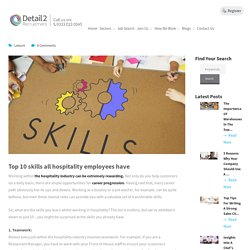
Not only do you help customers on a daily basis, there are ample opportunities for career progression. Having said that, every career path obviously has its ups and downs. How to Answer Tricky Interview Questions. Are you smarter than an interviewer?
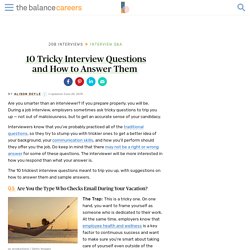
If you prepare properly, you will be. During a job interview, employers sometimes ask tricky questions to trip you up — not out of maliciousness, but to get an accurate sense of your candidacy. Interviewers know that you've probably practiced all of the traditional questions, so they try to stump you with trickier ones to get a better idea of your background, your communication skills, and how you'll perform should they offer you the job. Do keep in mind that there may not be a right or wrong answer for some of these questions. The interviewer will be more interested in how you respond than what your answer is. The 10 trickiest interview questions meant to trip you up, with suggestions on how to answer them and sample answers.
Are You the Type Who Checks Email During Your Vacation? The Cure for Toxic Positivity. When my dad was diagnosed with colon cancer at age 52, I was flooded with emails, calls, and in-person pep talks from friends and acquaintances.
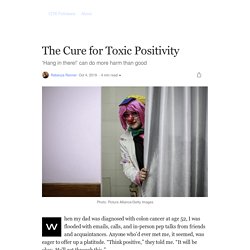
4 Years and 53 Fridays Later, I Moved On. Co-living's a Growing Trend - Not just among Millennials. A 21st-century version of dormitory living for adults is emerging as a way for city dwellers to deal with expensive real estate, social isolation and environmental pressures.
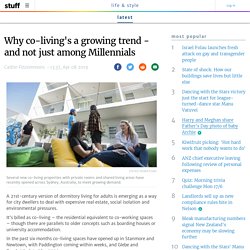
It's billed as co-living – the residential equivalent to co-working spaces – though there are parallels to older concepts such as boarding houses or university accommodation. In the past six months co-living spaces have opened up in Stanmore and Newtown, with Paddington coming within weeks, and Glebe and Randwick slated for 2020. Rebecca Dracup, an environmental engineer at Stantec-owned Wood and Grieve Engineers, said co-living was a growing trend around the world.
READ MORE: * How to make multi-generational living work for you * Two couples' new build designed for multigenerational living * Our changing homes show we're craving more connection * The benefits of multigenerational living * Extended family households growing but can Kiwi homes cope? The business of co-living. Want a Happy Relationship? The World's 'Most Comprehensive Study' Says It Comes Down to Just 1 Thing (Plus: How to Get It if You Don't Have It) Study after study proves people who have good relationships--especially with their spouse or significant other--are most likely to achieve happiness. But what if there was a single attribute that could predict whether relationships would be good enough--and whether the people in them would ultimately be happy or frustrated? Now, a massive research project (described by the university that sponsored it as the "most comprehensive study" of marriage happiness to date) says there is in fact one such single characteristic.
It's bigger than any of the other things we often think of in relationships--bigger than compatibility, growth, sexual attraction, intelligence, wisdom, or values. The single attribute? Social Exchange Theory. Explanations > Theories > Social Exchange Theory Description | Research | Example | So What? | See also | References Description All relationships have give and take, although the balance of this exchange is not always equal. Social Exchange theory explains how we feel about a relationship with another person as depending on our perceptions of:
Psychology of Cyberspace - In Person versus Cyberspace Relationships. Why Intelligent People Can't find Happiness - The Minds Journal. “Happiness in intelligent people is the rarest thing I know.” -Ernest Hemingway The presence of a faithful and loving partner, a great family life and a successful career may not be enough to prevent an intelligent soul to feel grief and melancholy. Here are six most likely reasons why happiness seems to elude highly intelligent people: The Assault on Empathy. One morning this past November, with my daughter about to visit and holiday gifts on my mind, I opened my MIT mail and found an intriguing “call for subjects.” How feelings took over the world. On a late Friday afternoon in November last year, police were called to London’s Oxford Circus for reasons described as “terror-related”. Seneca on Grief and the Key to Resilience in the Face of Loss: An Extraordinary Letter to His Mother.
How We Grieve: Meghan O’Rourke on the Messiness of Mourning and Learning to Live with Loss. Trending Topics ‹ Bot Sentinel. Social Norms. Did Media Literacy Backfire? - Data & Society: Points. Individuation. Escapades. Intelligences Ensemble. Multiple Intelligences. ASDs ASCs. Peopled Experiences. Sharing Secrets. Edgy. Govern.Mental. Busyness Modelling. US.A.ID. WorldWide. Less is more.
Les Autres.